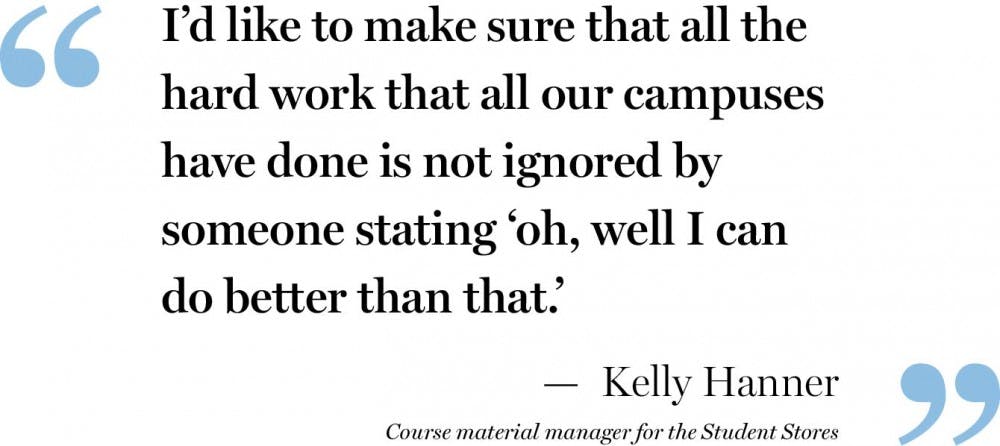Student Stores website merchandise and marketing manager Paul Cardillo encouraged anyone who wanted to see what Follett had to offer to go visit the Fan Shop.
“People might like it better than what Student Stores is offering,” Cardillo said. “I don’t think they will.”
UNC then decided to partner with MBS Textbook Exchange as its primary textbook provider. In spring 2015, Hanner said they bought back almost $300,000 in textbooks. Hanner said Student Stores worked hard to secure a partnership with MBS Textbook Exchange.
“I’d like to make sure that all the hard work that all our campuses have done is not ignored by someone stating ‘oh, well I can do better than that,’” Hanner said.
Along with an increase in textbook buyback, Gorsuch said MBS Textbook Exchange partnered with the University to develop textbook recycling and the green-sticker buyback system, which guarantees Student Stores will buy certain books back at the end of the semester.
And he said he wasn’t sure if a private company would continue these practices.
“It would be up to that leasing company,” he said. “The University, they’ve contracted it out to company X and it’s up to company X what to do.”
In Follett’s initial proposal to the University, Follett said they would give a minimum $3 million commission to the University every year.
Vice Chancellor for Finance and Administration Matt Fajack said this figure would go to scholarships. Student Stores currently spends its residual funds on nonathletic scholarships and fellowships — $6.65 million in the past 10 years, according to a document from Student Stores.
According to the same document, Student Stores has contributed $27.5 million to scholarships since 1955.
John Jones, who was the director of Student Stores from 1990 to 2010, said Follett’s promise to give $3 million to the University every year is not a full picture of what is going on. That figure, Jones said, might decrease when maintenance costs and remodeling debt are put into the equation. He worries these costs might also affect payroll.
“I do think they will give the certain amount of money for the top line sales,” Jones said. “Now, that being said, there are going to be expenses being taken from that. How much will be left, I don’t know.”
To get the day's news and headlines in your inbox each morning, sign up for our email newsletters.
“I think someone should look at what Student Stores is doing and do an apples-to-apples comparison, but it’s an apples-to-oranges comparison.”
Student Stores marketing manager Kyle McKay, who worked at Bull’s Head Bookshop when he was an undergraduate at UNC, is worried about the trade bookstore’s future if Student Stores is privatized.
“I can almost say with 100 percent certainty that Bull’s Head would either be totally eliminated or would just turn into kind of like if you went to an airport bookstore — not a place where we stock almost every UNC faculty book and have events for them,” McKay said.
McKay said much of what Student Stores does aims to benefit students, not necessarily to help the bottom line.
“For us, the most important thing is ‘are we serving the University and its people well,’” McKay said.
According to a survey completed in December 2014 by Statmats, a higher education marketing firm, 59.7 percent of students strongly agreed that UNC Student Stores should not be outsourced. Additionally, 70.7 percent of faculty, staff and administrators strongly agreed.
UNC-Asheville’s bookstore has been contracted through Follett since August 2011. Joy Flora, budget and auxiliary administration liaison at UNC-A, said in an email statement that their university has been pleased with their relationship.
“It is a five-year contract with the option to renew for an additional five-year period,” Flora said.
“Contracting with Follett has allowed us to stay current with technology and has provided expanded services for our students and faculty, including an extensive textbook rental program.”
Student Stores employees met with administrators Sept. 16 to discuss the possibility of privatization. In an interview, McKay said he was disappointed that the administrators didn’t seem to want to save the 100-year-old institution.
“There was no coming to the store and saying ‘Hey, what are some things we can do to maybe help you in this area or that area’ or anything that they might think another bookstore could do better,” McKay said.
Erica Eisdorfer, who worked at Bull’s Head for more than 30 years, said it would be reprehensible for UNC to privatize Student Stores.
“I totally understand wanting to go into a place and putting your mark on it. It’s like a dog with a bush. I think it’s irresponsible to mess with something of this caliber,” she said.
McKay said everyone who would be affected by privatization wants the best for the University.
“I think it’s just right now trying to help people understand why keeping Student Stores University-owned would be the best thing, both short-term and especially long-term,” McKay said.
“That’s what we’re going to hopefully be able to accomplish. We’ll see how it goes.”
university@dailytarheel.com




